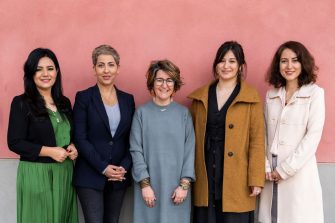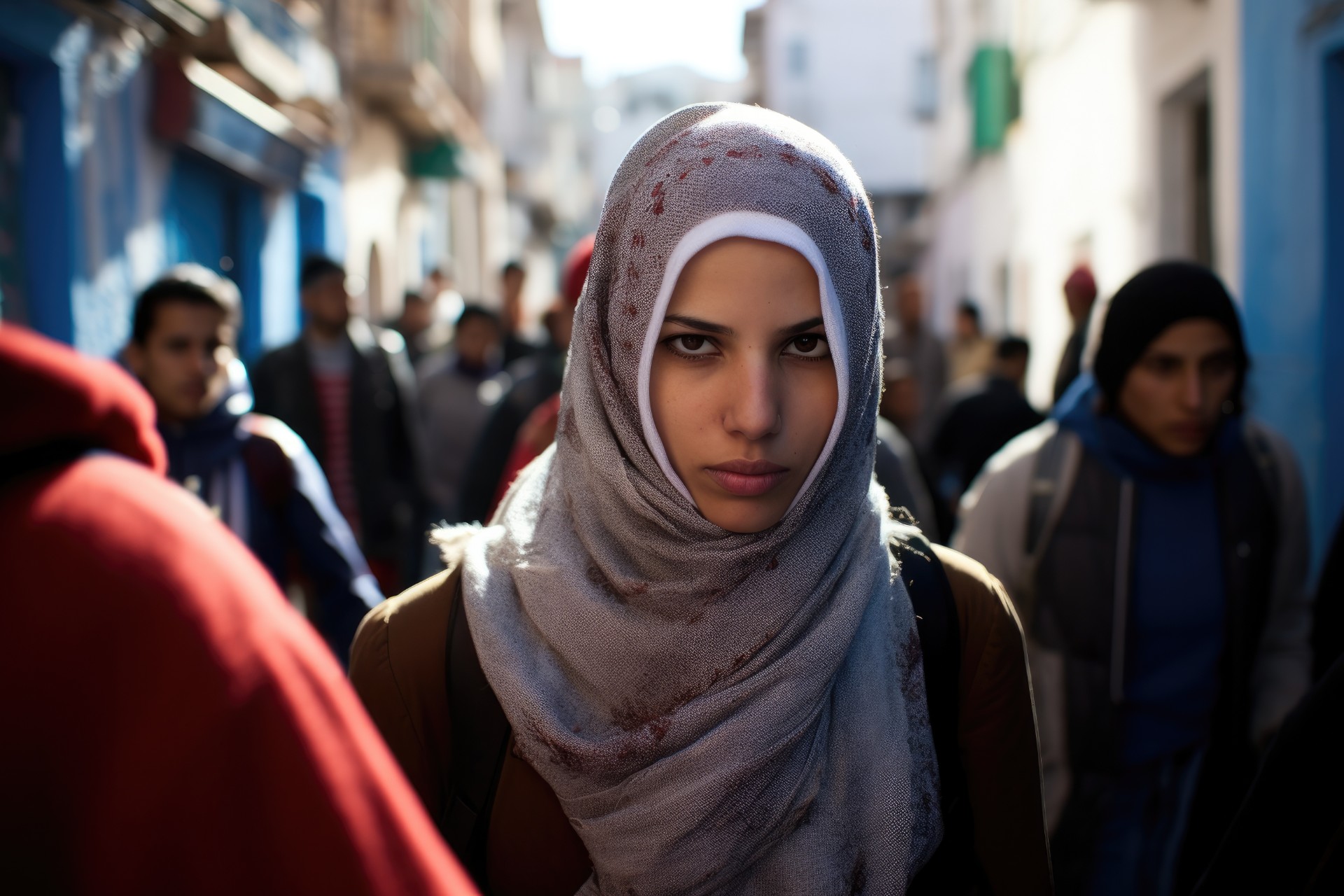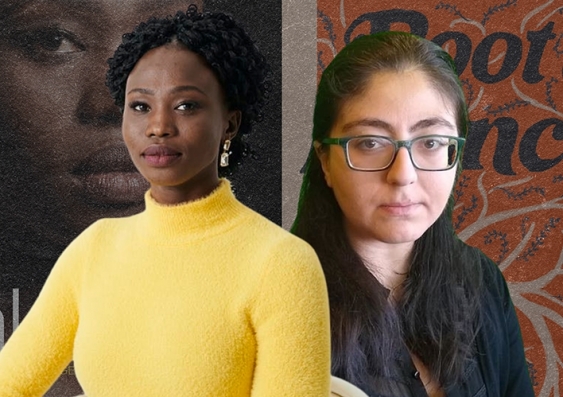Breaking barriers: JEINA expands its mission to empower displaced women
26 February 2025

The JEINA team (from left): Maryam Zahid, Dr Parisa Glass, Sherine Al Shallah, Samah Shda, Dr Elnaz Irannezhad.
Photo: UNSW
The Justice Inclusion Access (JEINA) initiative, a catalyst for empowering displaced women, is launching an entrepreneurship event in concert with International Women's Day, and a scholarship to promote professional growth.
Dr Parisa Glass remembers the moment she stopped being a child.
She was 15 when she fled Iran alone, escaping a regime that made survival impossible for young girls like her, opens in a new window. Born into the Bahá'í faith, she and her family faced persecution during the Islamic Revolution, living in fear as ultra-conservative forces seized power.

Dr Glass recalls nights as a child spent huddled in a car, her pregnant mother beside her, after mobs had surrounded their house chanting: “Kill the men, do whatever you wish to the women and children.”
Years later, when people ask about her journey, they fixate on the mountains she crossed, the danger of her escape as though to almost glamorise the experience. “Nobody wants to hear about what led me there,” she says. “Nobody wants to hear about human rights violations that forced me to leave my homeland.”
Today, Dr Glass is a leader in medical research at UNSW Medicine & Health and the Director of Innovation and Enterprise, opens in a new window at the George Institute for Global Health. Her career path is a testament to the transformative power of education.
But she is not alone in her experience. The barriers she faced – displacement, exclusion, and limited access to opportunity – persist for what the UNHCR conservatively estimates as 58 million women displaced worldwide.
Recognising the urgent need for change and inspired by the brave women of Iran, Dr Glass founded the Justice Inclusion Access (JEINA), opens in a new window project with the backing of UNSW, which continues to support its expansion and impact as part of the University’s defining Progress for All, opens in a new window strategy launched last week. This new initiative aims to accelerate solutions to global challenges by fostering collaboration across research, policy, and community action.
Laying the foundation for lasting change
Launched in 2024, JEINA is a pioneering initiative designed to support women from forced migration backgrounds including refugees, asylum seekers, and women living in exile as they pursue higher education at UNSW and career opportunities more broadly within the community.
JEINA provides critical resources and support to under-served communities, aligning with UNSW’s broader vision of driving social change through education, innovation, and community engagement. Through advocacy for inclusive policies, JEINA is forging pathways for displaced women to not just rebuild, but lead.
The name JEINA – derived from a Kurdish word and a name reserved for women, ژینا, meaning ‘life-giver’ – embodies its mission: to create pathways for displaced women to rebuild, thrive, and lead.
JEINA has forged partnerships across higher education, industry, and community sectors to create meaningful and diverse opportunities for displaced women. The ‘J’ in JEINA stands for justice, and justice, at its core, is about access to mentorship, scholarships, leadership training, and UNSW’s academic and professional networks.
In its first year, JEINA has engaged thousands of women through in-person workshops, events, and online platforms, building a vital sense of community.
But before launching solutions, JEINA made a critical decision: to listen first. Rather than imposing a program that might not reflect the diverse realities of displaced women, the initiative prioritised direct consultation with those affected – understanding their lived experiences, barriers, and aspirations.
This approach has ensured that JEINA is not just offering support, but shaping systemic change that is truly informed, sustainable, and impactful. By providing a safe space to share stories, foster ambition, and amplify voices, JEINA is creating pathways that extend far beyond UNSW.
A timely expansion: JEINA’s next chapter
This International Women’s Day, opens in a new window, JEINA is launching its second phase, a significant expansion that will deepen its impact by focusing on:
- Scaling mentorship and leadership programs to reach more women nationally.
- Increasing scholarships and career placements through stronger industry partnerships.
- Advocating for policy change to create more inclusive educational and professional environments.
As part of the launch, JEINA will co-host an event, opens in a new window on 6 March chaired by Dr Glass to uplift women from forced migration backgrounds taking their first step toward entrepreneurship.
A highlight of the event will be the announcement of the Inspire Scholarship, an initiative designed to help displaced women start and grow their own businesses, or to support their professional growth. Developed in partnership with UNSW JEINA, UNSW Founders, opens in a new window, Liverpool Innovation Precinct, and UOW iAccelerate, the Inspire Scholarship offers financial assistance, mentorship, and entrepreneurial training for displaced women to take tangible steps toward economic independence.
Dr Glass emphasizes that while education is a powerful tool, displaced women need more than access – they need structured, sustained support.
“The system wasn’t designed for us,” she explains. “JEINA exists to change that.”
Sherine’s story: a testament to JEINA’s impact
Sherine Al Shallah, a Lebanese Australian lawyer and doctoral researcher at UNSW affiliated with the Kaldor Centre for International Refugee Law, opens in a new window, identifies as a forced migrant. She has experienced and is deeply aware of the challenges that displaced people face.
During JEINA's consultation phase, Sherine was introduced to Dr Glass through the Kaldor Centre and she has collaborated with Dr Glass to design JEINA in connection with a growing network. Sherine's research at UNSW is around international law protection and the safeguarding of refugee cultural heritage which, she says, “humanises refugees by making sure that they are seen as full human beings”.

Extending impact beyond UNSW: community-led change
JEINA’s reach extends beyond academia to form partnerships with grassroots leaders and organisations. Afghan Women on The Move, opens in a new window (AWOTM), led by its founder and CEO Maryam Zahid, is at the forefront of empowering Afghan women in Australia through advocacy, social support, plus women’s health and wellbeing initiatives. AWOTM works at the grassroots level to close the gap in access to essential services, ensuring that displaced women are not only heard but actively supported in rebuilding their lives. Through strategic partnerships and community-driven programs, AWOTM fosters resilience and leadership among Afghan women.
By engaging in workshops, storytelling, and collaboration with organisations like AWOTM, the JEINA program strengthens a network of support that extends far beyond UNSW.
“Excellence is never an accident,” says Maryam Zahid. “It’s the result of high intention, sincere efforts, intelligent direction, and skilful execution” – values that both JEINA and AWOTM uphold in their missions to create lasting impact.

Fostering an inclusive future: the road ahead for JEINA
For Dr Glass, JEINA is about more than just opportunity; it’s about enriching Australia as a whole.
“Programs like this don’t just support displaced women – they make all of us stronger. By embracing these women and giving them the tools to succeed, we are building a more inclusive, peaceful, and prosperous society,” she says.
Dr Glass believes these initiatives are vital in fostering tolerance and kindness.
“In a world where there is too much division, we have a chance to show what inclusion really looks like,” she reflects. “By supporting each other, we enrich Australia and make it stronger.”
As JEINA enters its next phase, its message is clear: displacement does not define these women – opportunity does. “These women are resilient, brilliant, and capable,” Dr Glass says. “They just need a chance.”
Media enquiries
For enquiries about this story and to arrange interviews, please contact Ben Bertoldi, Communications Officer Equity, Diversity & Inclusion
Tel: +61 405 042 096
Email: b.bertoldi@unsw.edu.au
Related stories
-

Elections mean more misinformation. Here’s what we know about how it spreads in migrant communities
-

Cultural heritage is often overlooked when assessing refugee claims. Here’s why this is a mistake
-

Climate impacts are forcing people from their homes. When, how and why do they have valid refugee claims?
-

Young women's memoirs of migration and dispossession in Australia demand to be heard


